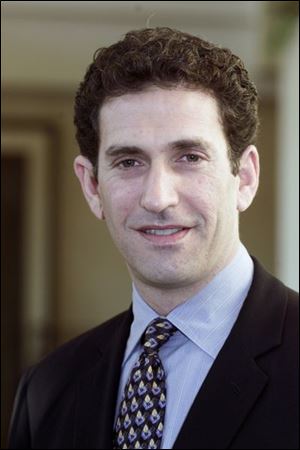
`Depth of hatred' makes accord unlikely
11/1/2000Deadly clashes in the Middle East have gone far beyond the predictions of the Clinton administration, ending any hope for a peace accord soon, a former U.S. foreign policy official told a local group yesterday.
“The depth of hatred has not been this raw in a decade'' between Palestinians and Jews, and it may be a long time before they agree to a settlement, James Rubin, a former assistant secretary of state, told KeyBank executives and guests at the Radisson Hotel in downtown Toledo.

Rubin: He says the extent of the strife was not foreseen.
The top spokesman for the State Department until last year, Mr. Rubin, 40, said the fighting in Jerusalem caused a breakdown in talks that were on the verge of a promising conclusion.
Now, with more than 143 people killed in the past month, “it's a terrible situation - more than any of us could have predicted.''
Most of the blame for the collapse in the negotiations can be placed on Palestinian leader Yasser Arafat and the unwillingness of the Palestinian people to accept the Israelis as neighbors, he said.
One big problem is a lack of any plan by the Palestinians to “educate their people on compromises necessary to make peace,'' said Mr. Rubin, including the acceptance of Jewish settlements in the West Bank.
He said credit should be given to Israeli Prime Minister Ehud Barak, who has “kept saying to the Israeli people, `We're going to have to make painful compromises,' even when it wasn't popular to say such things,'' Mr. Rubin said. “There was a real attempt to educate the people of Israel'' on the peace process.
Mr. Rubin's appearance in Toledo - part of KeyBank's speaker series - was made as violence continued in Jerusalem for the fifth consecutive week, pitting rock-throwing Palestinian youths against Israeli soldiers. Most of the people killed have been Palestinians.
His comments prompted a sharp response from John Shousher, president of the Lebanese-American Association of Toledo, who blamed the breakdown of the peace talks on former Israeli Prime Minister Ariel Sharon and Israeli soldiers who visited the sacred al-Aqsa mosque in September.
Mr. Sharon's appearance at the mosque in the Old City of Jerusalem was an attempt to “provoke” a breakdown in the negotiations, “because Sharon doesn't want peace,'' said Mr. Shousher, who did not attend yesterday's speech.
Mr. Rubin, who was foreign policy spokesman for the 1996 Gore-Clinton campaign, said Mr. Clinton tried harder than any U.S. president to reach out to all leaders in the troubled region. “He worked like a dog in the Middle East peace process, and really, really hoped'' there would have been some agreement during his presidency, Mr. Rubin said.
Even after the President announced a truce at an emergency summit two weeks ago in Bethlehem, gunfire and clashes erupted.
As far as the foreign policies of the two presidential candidates, Mr. Rubin told the local audience he didn't think there are “any real fundamental differences'' between the two politicians.”
He said Vice President Gore and Texas Gov. George W. Bush are “internationalists'' who favor helping nations under oppressive regimes. Both have rejected members of their parties who favor an isolationist stance, Mr. Rubin said.
Though Governor Bush constantly criticizes the administration for sending peace-keeping forces around the world, “he will find himself doing the same thing'' if he's elected, Mr. Rubin said.
“The last act of his father, President Bush, was to send tens of thousands of troops to Somalia to feed starving people.''
Mr. Rubin, whose spouse is Christiane Amanpour, CNN's chief international correspondent, said it will take time for the next president to grasp American foreign policy, as it did for President Clinton.
“There was a real low point in our foreign policy in 1993. I can still recall the terrible tragedy of our soldiers killed in Somalia and being dragged through the streets of Mogadishu.''